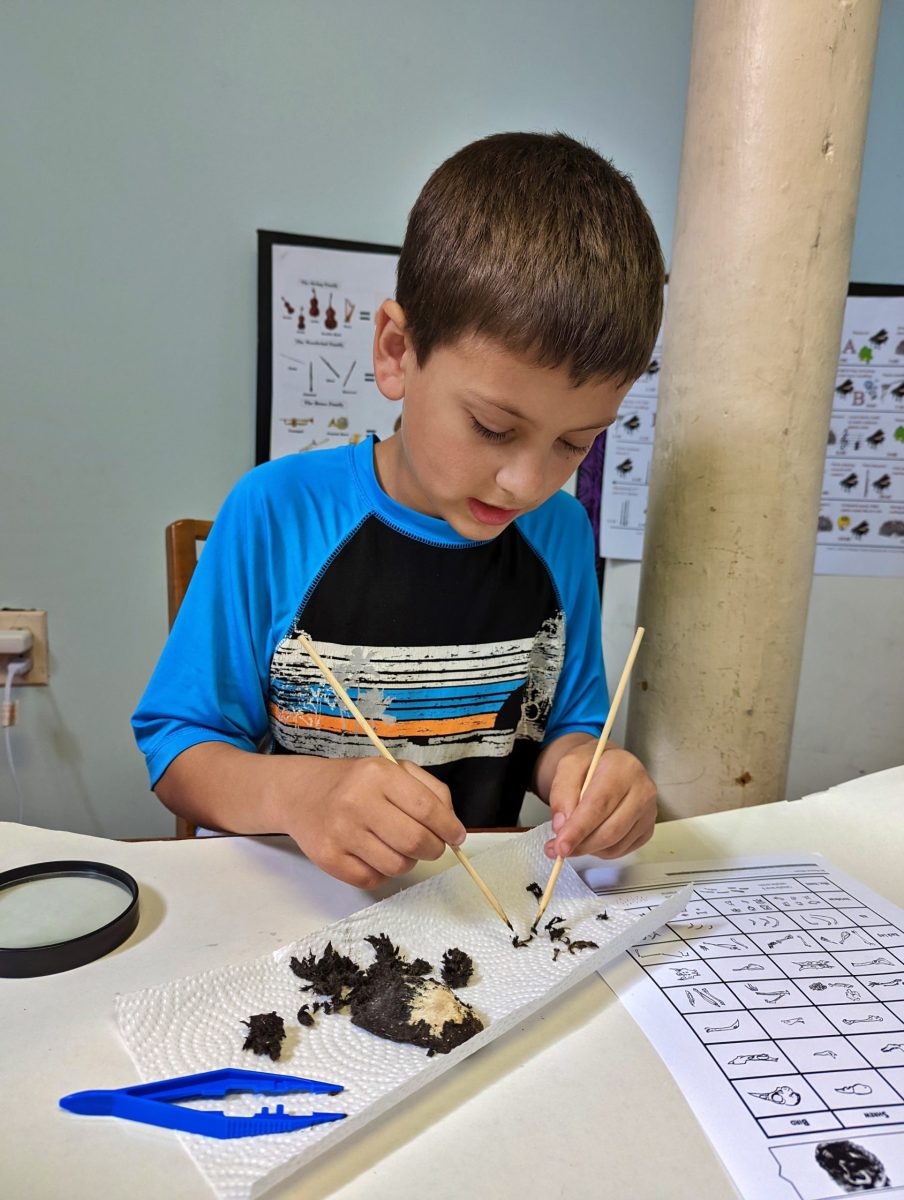When I found out I was pregnant with twins, I was shocked. No, scratch that. “Overwhelmed” would be the more appropriate term. I remember blubbering, “I’m not supposed to have twins. I already have two kids!” (Not to mention my #2 was at a particularly challenging age).
As a homeschool mom, it was then and there I became acutely aware of why the #1 learning goal in my homeschool should be to be the development of independent learners.

Benefits of Independent Learning
It may be easy to see why having independent learners will benefit you as the homeschool parent—especially if you have a big family. But if your own education took place in the classroom, it might not seem immediately obvious why giving your kids ownership of their learning is so important.
1. Save Time with Independent Learning
You will save time. Nuff’ said. When you don’t need to handhold your child through each and every subject of the day, it saves you time. The more kids you have, the more pronounced this benefit will be.
2. Increased Freedom & Flexibility
Your family will have more freedom and flexibility. When your child is setting their own schedule and defining their own routine (based on both their educational goals and the family’s schedule), this frees you up to do more elsewhere.
3. Self-Monitor to Learn at the Right Pace
Your child will learn at a pace that’s right for them. More advanced students can simply learn the material faster because they are setting their own goals and are able to self-monitor. Students that need more time are able to slow down where needed and can learn to self-assess.
4. Strengthen Reading & Comprehension

Your child will develop strong reading and listening comprehension skills in a given lesson when they’ve learned how to pick up a book or listen to a lecture and mine it for important information (without you needing to prod it out of them).
5. Develop the Skills of Perseverance & Persistence
Your child will learn how to push through difficulty or confusion to achieve a goal. Perseverance and persistence are valuable character traits for life. Helping your students learn these behaviors will be an invaluable asset as they grow towards adulthood.
6. Develop a Deeper Understanding of Material
Your child will develop critical thinking skills allowing them to examine all possibilities, come up with multiple solutions, ask the deeper “why” questions, and develop a deeper understanding of the material.
7. Develop Responsibility & Effective Time Management

Your child will experience the blessings of responsibility, organization, and effective time management. When they take the initiative and succeed at something, they learn from experience how they can become more efficient in their own learning.
8. Less Frustration in the Family
You will be less frustrated, no longer using bribes and contrived incentives. And a less frustrated homeschool mom means everyone in the house is happier. Independent learners see the value of completing their educational goals—even if the only value they see at the moment is “getting it done.”
Hopefully, it’s clear now, that independent learning is an asset to the homeschooling environment, but will continue to serve your kids throughout their whole life.
Long-Haul Mentalities to Foster Independence in the Learning Process
My goal as a homeschool mom is to have my kids established independent learners by the time they reach middle school, but you don’t have to wait until then to start. Begin establishing some of these mentalities when your kids are young to set them up for success as they get older.
Enjoy teaching your kids
—and let them see it.
A good teacher-student relationship is key in developing a child’s love of learning. Love what your kids are learning and love watching them learn it.
Train delayed gratification.
Not understanding how to label a part of speech or having to wade through a ton of math problems can be frustrating. But independent learners know how to manage their feelings, especially how to be patient and push through.
One of the most effective ways to do this is to train your kids to use “self-directed speech,” where they get into the habit of simply speaking aloud to themselves the benefit they are waiting for.
Delayed gratification is a skill that’s built over time. Don’t expect them to sit for long periods of time as young students and work through school work, but increase the time gradually over the months and years. Delayed gratification should be taught in all areas of life—including education.
Model a love of reading…
…and encourage reading confidence. My number one goal in the early years is to teach my kids to become strong readers. A child who knows how to read well and enjoys reading will find independent learning more natural. Read aloud to your kids. Find books they love. Limit mindless entertainment.

Stay positive.
Generally speaking, showing kids you’re frustrated with them for being slow to understand something, or saying you “don’t really care right now,” isn’t very helpful. Be encouraging. When you aren’t, own up to it, apologize, and show them you love them.
Teach your child scaffolding.
If your student is overwhelmed, teach them how they can break their learning goals into chunks, so it feels a little less formidable.
Allow your students to vocalize their preferences when choosing a curriculum.
This allows them to take some ownership of their learning. While you might not choose everything they want, give them some options — would you prefer to study Biology in 4th grade, or Earth Science?
And don’t forget to get their feedback at the end of the school year and consider what worked, what didn’t work, and what was just meh. Don’t be afraid to collaborate with your kids especially as they get older! Bring them into the lesson planning phase.
Check out some practical strategies for helping your kids become successful independent learners.
Consider Independent Study Options
Consider homeschool curricula that are set up to be independent study programs to enhance your independent learning goals. Our courses here at Journey Homeschool Academy focus on helping students learn independently in an age-appropriate way. There are developmentally appropriate ways to increase independence as students mature. Students that are 7 don’t have the same capabilities as students who are 17.

Elementary
Our elementary curriculum is designed to introduce kids to new concepts and get them excited about learning science. By feeding your students’ appetite for new knowledge, we’re helping you set the stage for success later on.
Since young children are also growing their capacity to both memorize and imagine, we help them build a strong foundation for future learning through living books, videos, hands-on activities, copywork, and—yes—quizzes.
Students at this age can still begin to complete relevant tasks on their own. Students can watch videos and dictate what they’ve learned to you. They can take quizzes. If they are strong enough readers, they can read living books to continue exploring the subject matter.
Middle School
As your kids enter middle school, our curriculum encourages natural growing independence that students are beginning to exercise. As part of this process, students learn skills like planning and organization, with the safety net of guidance (from the structure of our curriculum). We hold students’ hands through the process of planning and completing assignments and taking notes.
High School
In high school, it’s time for your students to jump into the deep end. They now have the higher-level thinking skills to draw connections among completely unrelated concepts. At Journey Homeschool Academy, our high school curriculum encourages critical thinking skills and independence. We believe when you raise the bar by providing opportunities like writing real lab reports (vs. fill-in-the-blank worksheets) and projects that require multiple steps, your student will take pride in rising to the occasion.

Watch your students’ confidence soar as their academic performance improves when your student takes ownership of their learning!
Click the button at the bottom of the page to check out free lessons for each of our courses to see how Journey Homeschool Academy can help guide your students toward independent learning success.

